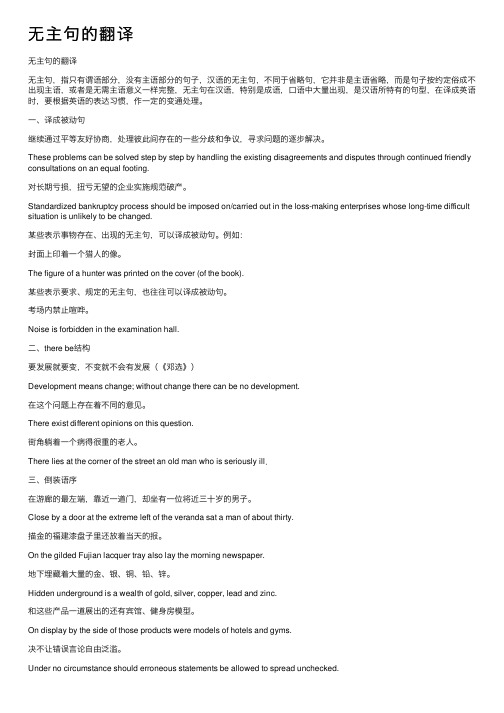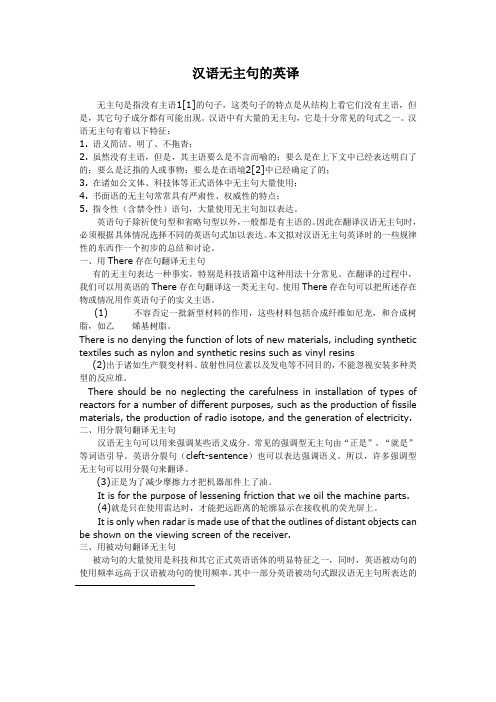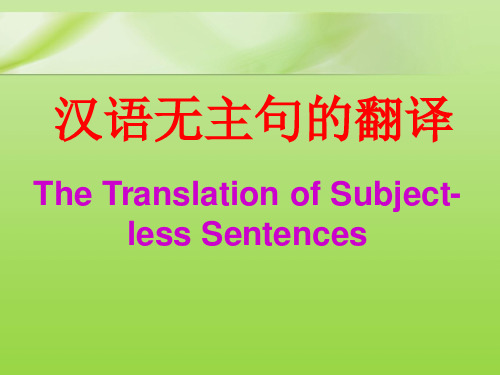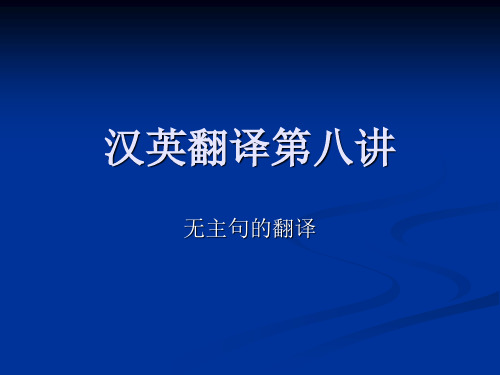无主句翻译
无主句的翻译

3. 要广泛动员中小学生学习科普知识。
Primary school and high school students should be mobilized to learn popular science knowledge.
译为祈使句
1. 请勿践踏草坪!
Please keep off the lawn!
there be…句型
2. 没有顺利,无所谓困难;没有困难,也无所谓顺利。 Without facility, there would be no difficulty, without difficulty, there would also be no facility.
it be…+to…句型 1. 要成功就要付出劳动。 It will cost you much labor to succeed in anything. 2. 要是去参观那个展览会会很有意思。 It would have been amusing to have gone to the exhibition.
2.下雨了,咱们快走吧。
It’s raining now. Let’s get going.
5
用泛指癿人称代词填补主语
1. 活到老,学到老。 One is never too to learn.
2. 丌承认这一条真理,就丌是共产主义者。 Anyone who does not recognize this truth is no communists.
无主句癿翻译
BY:
定义:
汉语中,只有谓语而没有主语的句子叫做无主句。 这是汉语当中特有的一种句型。但所谓无主句,并 丌是“省略句”,而是在习惯上就那样讲,那样写 的;其主语是什么,往往行难断定;但是在任何环境 里它都能表达完整而明确的意思,如“下雨了”等 等。在英语里,句子一般都有主语,没有主语的情 况很少见。因此,汉语的无主句译成英语时,往往 要补出主语或改变句型,使句子结构符合英语语法 的特点。
笔译技巧:无主句如何翻译

笔译技巧:⽆主句如何翻译笔译技巧:⽆主句如何翻译 如何处理汉语⽆主句的英译?⼀般有以下两种处理办法:寻找主语以及改变句式。
⽆主句,即只有谓语部分⽽没有主语的句⼦,是汉语中特有的⼀种句型。
因为汉语注重意合,只要意思表达正确即可,⽽英语注重形合,句⼦⼀般都不能缺少主语,例外较少。
如何处理汉语⽆主句的英译?⼀般有以下两种处理办法:寻找主语以及改变句式。
主语的选取 基本做法是有可以直接使⽤的主语就⽤;没有的就挖掘隐藏主语;找不出来的就考虑增补;⼀个句⼦有太多主语的就选。
以it为主语 (1) 表⽰天⽓变化、事实情况时: 外⾯下⾬了。
(天⽓) It is raining outside. 该吃饭了。
(时间、事实) It is time for dinner. 轮到你了。
It’s your turn. (2) 表⽰⼈们的观点、意见时,可⽤固定句型it is reported/said/believed that… 据说⽂明总是在进步。
It is said that civilization is always on the move. 据说算命的⼈可以预知未来。
It is believed that fortune - tellers can foretell your fate. 以they, things, you ,he ,one做主语 通常出现在谚语中表⼀般泛指: 不到长城⾮好汉。
译法⼀:He who doesn't reach the Great Wall is not a true man. 译法⼆:You're not a true man until you get to the Great Wall. 译法三:One who fails to reach the Great Wall is not a hero. 有时候要到达⾕底,才会慢慢变好。
Sometimes things have to fall apart to make way for better things. 表⼀般要求的句⼦,通常以⾮谓语作为句⼦主语 要想提⾼⼿眼协调能⼒,就练习投球和接球。
无主句翻译

改革开放胆子要大一些,要敢于试验。 When it comes to reforms and opening-up, we must be courageous enough to venture on experiments.
2. 2 主语必须是句中应该突出的信息
人们已把李白的诗集译成了多种外国文字。 The collection of Li Bai’s poems has been translated into many foreign languages. 上海采取了一系列的优惠政策来吸引外资。 A series of preferential policies have been adopted in Shanghai to attract foreign capital.
汉语是重内容的语言,“形散神聚”是汉语句子 的特点。因此汉语被称作是典型的“意合”语言。 汉语中的主语不像英语的主语那样容易确定, “主语-谓语”形式的句子在汉语里比例是不大 的,因此在汉语语法中出现了主题(话题) (Topic)这一概念。我国著名学者赵元任(1968) 说:“把主语、谓语当作话题和说明来看待,比较 合适” 。汉 语属于“主题突出”型(Topicprominent)语言
2
主语选择的原则
无主句必须添加必要的主语; 必须是句中应该突出的信息; 必须符合英美人的思维视角; 必须符合英语的逻辑搭配习惯; 必须符合行文连贯的需要。
2. 1 无主句翻译,添加必要的主语
下雨了。 It is raining. 得第一名获金牌,第四名什么也拿不到。 Whoever comes first wins a gold medal but anyone who comes fourth gets nothing.
sd 汉译英 无主句的翻译

汉英翻译技巧
无主句的翻译
一. 译成被动句结构 二. 译成“There+be…”句型 三. 译成“It/one+be…+to…” 四. 译成倒装句 五.译成祈使句 六. 增补主语
汉语中,只有谓语动词而没有主语部分的句子叫做无 主句。 这是汉语中特有的一种句型。
汉语无主句的主要特征 汉语无主句的英译法
六. 增补主语
汉语无主句的英译,除上述几种方法外,还可以根
据上下文选用适当的名词或代词(包括人称代词和 否定代词)补出主语,构成一个完整的句子。例 如: (1)弄得不好,就会前功尽弃。 If things are not properly handled, our labor will be totally lost. (2) 知彼知己,百战不殆。 Know the enemy and know yourself, and you can fight a hundred battles with no danger of defeat. (3)只准州官放火,不准百姓点灯。 One man may steal a horse, while another may not look over the hedge.
练习4
4. 不冒点风险,办什么事情都有百分之百的把握, 万无一失,谁敢说这样的话? Who dares to claim that he is 100 percent sure of success right from the beginning and without taking any risk? There is no such thing as certainty.
中美两国的社会制度和对外政策有着本质的区别。但是,双方同意,各 国不论社会制度如何,都应根据尊重各国的主权和领土完整、不侵犯别 国、不干涉别国内政、平等互利、和平共处的原则来处理国与国之间的 关系。国际争端应在此基础上与以解决,而不诉诸武力和武力威胁。 There are essential differences between China and the United States in their social systems and foreign policies. However, the two sides have agreed that countries, regardless of their social systems, should conduct their relations on the principles of respect of the sovereignty and territorial integrity of all states, non-aggression against other states, non-interference in the internal affairs of other states, equality and mutual benefit, and peaceful coexistence. International disputes should be settled on this basis, without resorting to the use or the threat of force.
无主句的翻译

⽆主句的翻译⽆主句的翻译⽆主句,指只有谓语部分,没有主语部分的句⼦,汉语的⽆主句,不同于省略句,它并⾮是主语省略,⽽是句⼦按约定俗成不出现主语,或者是⽆需主语意义⼀样完整,⽆主句在汉语,特别是成语,⼝语中⼤量出现,是汉语所特有的句型,在译成英语时,要根据英语的表达习惯,作⼀定的变通处理。
⼀、译成被动句继续通过平等友好协商,处理彼此间存在的⼀些分歧和争议,寻求问题的逐步解决。
These problems can be solved step by step by handling the existing disagreements and disputes through continued friendly consultations on an equal footing.对长期亏损,扭亏⽆望的企业实施规范破产。
Standardized bankruptcy process should be imposed on/carried out in the loss-making enterprises whose long-time difficult situation is unlikely to be changed.某些表⽰事物存在、出现的⽆主句,可以译成被动句。
例如:封⾯上印着⼀个猎⼈的像。
The figure of a hunter was printed on the cover (of the book).某些表⽰要求、规定的⽆主句,也往往可以译成被动句。
考场内禁⽌喧哗。
Noise is forbidden in the examination hall.⼆、there be结构要发展就要变,不变就不会有发展(《邓选》)Development means change; without change there can be no development.在这个问题上存在着不同的意见。
无主句的翻译

汉语无主句的英译无主句是指没有主语1[1]的句子,这类句子的特点是从结构上看它们没有主语,但是,其它句子成分都有可能出现。
汉语中有大量的无主句,它是十分常见的句式之一。
汉语无主句有着以下特征:1. 语义简洁、明了、不拖沓;2. 虽然没有主语,但是,其主语要么是不言而喻的;要么是在上下文中已经表达明白了的;要么是泛指的人或事物;要么是在语境2[2]中已经确定了的;3. 在诸如公文体、科技体等正式语体中无主句大量使用;4. 书面语的无主句常常具有严肃性、权威性的特点;5. 指令性(含禁令性)语句,大量使用无主句加以表达。
英语句子除祈使句型和省略句型以外,一般都是有主语的。
因此在翻译汉语无主句时,必须根据具体情况选择不同的英语句式加以表达。
本文拟对汉语无主句英译时的一些规律性的东西作一个初步的总结和讨论。
一、用There存在句翻译无主句有的无主句表达一种事实,特别是科技语篇中这种用法十分常见。
在翻译的过程中,我们可以用英语的There存在句翻译这一类无主句。
使用There存在句可以把所述存在物或情况用作英语句子的实义主语。
(1) 不容否定一批新型材料的作用,这些材料包括合成纤维如尼龙,和合成树脂,如乙烯基树脂。
There is no denying the function of lots of new materials, including synthetic textiles such as nylon and synthetic resins such as vinyl resins(2)出于诸如生产裂变材料、放射性同位素以及发电等不同目的,不能忽视安装多种类型的反应堆。
There should be no neglecting the carefulness in installation of types of reactors for a number of different purposes, such as the production of fissile materials, the production of radio isotope, and the generation of electricity.二、用分裂句翻译无主句汉语无主句可以用来强调某些语义成分。
无主句的英译[精华]
![无主句的英译[精华]](https://img.taocdn.com/s3/m/96958131a4e9856a561252d380eb6294dd882290.png)
汉译英汉语无主句的英译1. 通常六点半开灯。
The lights are usually turned on at 6:30.2. 继续改善居民住房条件。
Housing conditions should be continuously improved.3. 处处有热心人。
There are warm-hearted people everywhere.4. 到什么山上唱什么歌。
Sing different songs on different mountains.5. 打得赢就打,打不赢就走。
Fight when you can win, move away when you cannot.6. 要在工作中获得成功,就必须有耐心。
One must be patient if one wants to win success in work.7. 墙上挂了一些画。
Some pictures were hung on the wall.什么叫无主句?▪在汉语中,只有谓语而没有主语部分的句子叫无主句(非主谓句)。
▪但无主句,并不是省略了主语的句子,汉语中省去主语的句子属于“省略句”。
▪汉语无主句本身是完整的,不必补上什么,但意义一目了然。
▪汉语省略句由于一定的语言环境省略了某个成分,需要时可以准确地补出来。
▪例如,对话时,一个人说“别玩火”!▪这个祈使句是省略主语的主谓句,可以补出主语“你”或“你们”。
▪而公共场所所写的“ 禁止烟火!”(No burning! 或No Smoking!)▪这个句子本身是完整的,不必补出什么成分。
汉语中存在着大量的无主句。
据相关统计,汉语中所谓主谓句和非主谓句各占一半。
文言文中主谓句还要少。
▪可是在英语里,句子一般都要有主语,没有主语是例外。
汉语存在大量无主句的成因:▪英语重形合,属语法型,语法形式是显性的,句子有严谨的主谓结构。
而汉语重意合,属语义型,语法形式是隐性的,句子注重意念连贯,不求结构完整。
四级翻译技巧:汉译英-无主句的翻译方法

四级翻译技巧:汉译英-⽆主句的翻译⽅法相关推荐四级翻译技巧:汉译英-⽆主句的翻译⽅法 关于提⾼英语笔译能⼒的⽅法,今天⼩编给⼤家整理了⼀些简单实⽤的的英语技巧,觉得有⽤的话快收藏吧。
汉语⽆主句较多,⽽英语句⼦⼀般都要有主语,所以在翻译汉语⽆主句的时候,除了可⽤英语⽆主句、“There be…”结构或者根据情景补出语境来翻译之外,运⽤被动语态来翻译也是常⽤技巧。
例1____________(利⽤电脑)to collect the data much better. 译⽂:Computer is used例2 没有能量,没法做功。
译⽂:No work can be done without energy.例3 通常六点半开灯。
译⽂:The lights are usually turned on at 6:30. 这三句都没有讲明动作的主语是谁,因此考试的时候翻译成英语时最好的办法是运⽤被动语态。
被动语态是⼀个独⽴的主动语态转变⽽来的从属性语态。
主动句与被动句的转换是受到词汇和结构等因素的限制的。
汉译英时不能拘泥于原结构,要摆脱原句状态的局限,采⽤灵活多样的翻译技巧。
但是,考⽣⼀定要在语态选择中注意以下这两点: 第⼀,有⼀些动词和词组不能⽤于被动语态。
它们是:come true,consist of,take place,happen,become,rise,,break out,appear,arrive,die,fall,last,exist,fail,succeed等。
例4__________(这件事发⽣)before liberation 译⽂:This took place 第⼆,下列动词的主动语,⽽且常与well,quite,easily,badly等副词连⽤。
它们是:wash(洗),sell(卖),read(读),wear(穿),blame(责备),ride(乘坐),write(写)等。
26无主句的翻译

无水则无 Without water there would be no fish. 好多年以前,这个村子里住着六个盲人。 A long, long time ago, there lived six blind men in this village.
萝卜青菜,各有所爱。
There is no account for taste.
25
这几天心里颇不宁静,今晚在院子里坐着乘凉, 忽然想起日日走过的荷塘……
I have felt quite upset recently. Tonight, when I was sitting in the yard enjoying the evening cool, suddenly occurred to me the Lotus Pond around which I lingered everyday…… 白天里一定要做的事,一定要说的话,现在都可 不理。 All that one is obliged to do, or say, in the daytime, can very well be cast aside now. 26
只准州官放火,不准百姓点灯。
The magistrates are free to burn down houses, while the common people are forbidden even to light lamps.
在那桃花盛开的地方,有我可爱的故乡。
My lovely hometown lies (in the place) where peach flowers are in blossom.
不能不佩服他多年来埋头苦干的精神。
One cannot but admire his perseverance in keeping his nose to the grindstone for all these years.
无主句的翻译综述

(2) 这儿将修建更多的居民大楼。 More apartment houses will be built here.
(3) 去年发现了一种稀有元素。 A rare element was found last year.
2. 某些表示要求、规定的无主句,也往往可以 译成被动句。 例: (1)必须保证八小时睡眠。 Eight hours' sleep must be guaranteed. (2)本剧场内禁止吸烟。 Smoking is not allowed in the theatre.
二、采用英语存在句来译
1. 汉语中某些格言、经验或带有哲理的无主 句,翻译时一般采用这种结构。
例:没有顺利,无所谓困难;没有困难,也 无所谓顺利。 Without facility, there would be no difficulty; without difficulty, there would also be no facility.
汉语里,这种无主句比比皆是。 可是在英语中,句子一般都要有主 语,没有主语是例外。因此,汉语 的无主句译成英语时,往往需要补 出主语或改变句型,使句子结构符 合英语语法的规范。
汉语无主句的特征:
1. 语义简洁、明了、不拖沓; 2. 虽然没有主语,但是,其主语要么是不言而喻的; 要么是在上下文中已经表达明白了的;要么是泛指 的人或事物;要么是在语境中已经确定了 的; 3. 在公文体、科技体等正式语体中无主句大量使 用; 4. 书面语的无主句常常具有严肃性、权威性的特点; 5. 指令性(含禁令性)语句,大量使用无主句表达。
七. 根据具体情况,选取一个适当的 主语来翻译无主句。
很多情况下,我们可以在英语译文中增 加泛指人称代词作为句子主语。有时,也可 以根据增加或选用一个恰当的名词主语。 (1)必须熟习各种国际惯例。 You should be familiar with various international practices. (增加泛指人 称代词you)
四级翻译-第二章-无主句的翻译

例2:学习中国功夫,多半在深山的寺院里面。
To learn Chinese kung fu, one would stay at a temple in
secluded mountains.
4
例3:要更好地了解中国,可以有很多视角。 To understand China better, one may approach it form different angles. 例4:生于忧患,死于安乐,要居安思危,有备无患。 One prospers in worries and hardships, while perishing in ease and comfort. We must think of danger in times of safety and always be prepared for the worst.
8
中国人称结婚为终身大事,因为中国人的家族观念很重,认为 齐家是治国的根本。 Chinese people define marriage as a lifelong event, because they have a strong family ideal, with the belief that running a good family is the foundation for running the country.
汉英翻译第九讲无主句的翻译

(4) 请讲慢一点。 Speak a little slower, please. (5) 到什么山上唱什么歌。 Sing different songs on different mountains. (6) 为建设一个伟大的社会主义国家而奋斗! Strive to build a great socialist Country!
一.运用英语的被动结构
把汉语无主句中的宾语转换成英语被动结 构中的主语,这是汉语无主句英译时比较 重要的方法之一。 某些表示事物存在、出现的无主句,可以 存在、 译成被动句。例如: 封面上印着一个猎人的像。 The figure of a hunter was printed on the cover (of the book). (2) 这儿将修建更多的居民大楼。 More apartment houses will be built here. (3) 去年发现了一种稀有元素。 A rare element was found last year.
汉英翻译第八讲
无主句的翻译
汉语中,只有谓语动词而没有主语部分的句子叫 做无主句。这是汉语中特有的一种句型。但所谓 无主句,并不是省略了主语的句子(汉语中省去 主语的句子属于“省略句” 主语的句子属于“省略句” ),而是在习惯上就 那样讲、那样写的;其主语到底是谁,是什么, 往往很难断定;但是在任何语言环境里它都能表 达完整和明确的意思,如:“下雨了” 达完整和明确的意思,如:“下雨了”,“楼前 栽了两棵松树” 栽了两棵松树”,“村子里呈现出一片新的气象” 村子里呈现出一片新的气象” 等等。在汉语里,这种无主句比比皆是。可是在 英语中,句子一般都要有主语,没有主语是例外。 因此,汉语的无主句译成英语时,往往需要补出 主语或改变句型,使句子结构符合英语语法的规 范。 汉语无示请求、命令、号召、标语、口号等 请求、命令、号召、标语、 无主句,可仿照英语中的同类句式来译。例如: 请勿吸烟。 No Smoking. (2) 此处禁止停车。 NO Parking. (3) 中国共产党万岁! Long live the Chinese Communist Party!
《无主句的翻译》课件

欢迎来到《无主句的翻译》PPT课件。本课程将帮助您理解无主句,并提供翻 译原则和实例,以及练习机会。让我们一起开始无主句?
定义
无主句是指在英语中缺少明确主语的句子结构。
示例
比如:“正在响铃的电话。”
无主句的翻译原则
1 全部出主语
在翻译时,需要给无主句补充一个合适的主语。
结语
希望本课件能够帮助您更好地 理解和应用无主句的翻译。
例句:汤姆做完作业后上床睡觉。
3
示例三:Being a doctor, she has a busy job.
例句:她是医生,工作很忙。
翻译练习
1
练习一:The sun having set, we decided to go home.
练习:太阳已经下山了,我们决定回家。
2
练习二:Her hair still wet, she left the house in a hurry.
2 根据上下文理解语义
通过上下文进行推断,了解无主句的隐含语义。
3 采用恰当的时态和语态
根据上下文和句意,选择合适的时态和语态进行翻译。
翻译实例
1
示例一:The phone is ringing.
例句:电话正在响。
2
示例二:Having finished his homework, Tom went to bed.
练习:她的头发还湿着,在匆忙中离开了房子。
3
练习三:The cake baked, the cook took it out of the oven.
练习:蛋糕烤好了,厨师把它从烤箱里拿出来。
总结
再次强调翻译原则
理解无主句的原则对准确翻译 至关重要。
第八章 汉语无主句的翻译

第八章汉语无主句的翻译翻译汉语无主句,可根据上下文添加主语,也可转换句子结构,译为英语中的被动句、“There be”句型、倒装句或祈使句。
一、译为被动句无主句中动词带有宾语,而且宾语比较短小,可以译为英语的被动句,利用汉语原句中的宾语作为被动句的主语。
1. 有效保护儿童权利。
The right of children should be effectively protected.2. 继续改善居民住房条件。
Housing conditions should be continuously improved.3. 进一步深化国有企业改革。
Reform of State-owned enterprises will be deepened.4. 支持、鼓励和引导私营、个体企业尤其是科技型中小企业健康发展。
The sound development of privateenterprises, especially small and medium-sized science and technology enterprises, will be supported, encouraged and guided.5. 继续通过平等友好协商,处理彼此间存在的一些分歧和争议,寻求问题的逐步解决。
These problems can be solved step by step by handling the existing disagreements and disputes through continued friendly consultations on the equal footing.6. 对长期亏损,扭亏无望的企业实施规范破产。
Standardized bankruptcy processes should be imposed on/carried out in the lossing-making enterprises whose long-time difficult situation is unlikely.7. 必须推进以德育为核心,以创新精神和实践能力为重点的素质教育。
Non-Subject Sentences

英语祈使句中许多都是无主句
例7. Get prepared for your
examination.
译:好好准备考试。 例8 .Leave it alone. 译:放开它。
英语中的部分倒装句为无主句
例8:There goes the bell. 译:铃响了。 例9:Then followed eight years
of the Anti-Japanese War.
译:接着是八年抗战。
例10:It seems that Jack’s
idea is more practical.
译:看起来 杰克的意见更实际 一些。
Thank you!
方法2:用被动句翻译无主句
例2. 房子盖在西院。 译:The house is built in the west yard.
例3.除液化汽之外,不可使用其它燃料。 译:No other fuel but liquefied gas is
allowed
方法3:利用英语的祈使句句型翻译
例4.开机前,务必把机器放平稳。 译:Make sure that the machine is level
例6 .It is your best choice
to take the tonic on an empty stomach.
译:最好空腹服此补品
英语中有一些招牌用语、包装物的指示 说明等都有着约定俗成的说法。
例7பைடு நூலகம் Right side up. 译:此端向上 (除此之外还有Hands off“请勿动手”、
before starting.
(类似还有“小心轻放”“Handle with care” “请勿在此喧哗”“Don’t talk here ”)
- 1、下载文档前请自行甄别文档内容的完整性,平台不提供额外的编辑、内容补充、找答案等附加服务。
- 2、"仅部分预览"的文档,不可在线预览部分如存在完整性等问题,可反馈申请退款(可完整预览的文档不适用该条件!)。
- 3、如文档侵犯您的权益,请联系客服反馈,我们会尽快为您处理(人工客服工作时间:9:00-18:30)。
4.不要去等待“合适的时间”,现在就行动! • Don’t wait for the “right time”. Move now! 5.别费心机去洞察女孩的心思,因为她们总在变。 • Don’t bother to penetrate girls’ minds as they are always changing. • Don’t even try to understand a girl’s mind as it is always changing.
II. 翻译思路
• 汉语句子中主语隐含或无主语时常可见。 译成英文必须依照英语的要求,将主语增 补进来,或者另觅它途。进行增补时首先 要推敲语境,其次要考虑英语语法习惯和 行文的需要。另觅它途时要考虑句子的功 能以及和上下文的衔接情况。 • 构建翻译句子的整体框架 • 确定译文整个句子中各个成分,尤其是确 定以什么作为英语主语。
B. Using the empty subject “it”
• “It” in English is always used for weather, time, and some other natural phenomena. Some of the Chinese subjectless sentences describing natural phenomena or time can be translated into English sentences with “it” being the subject.
E. Translating into English imperative sentences
1.此处不准抽烟! No smoking! 2.请大声点! Louder, please. 3.中华人民共和国万岁 Long live the People's Republic of China! 4.不自由,毋宁死。 Give me liberty or give me death.
Chapter 9 无主句翻译
Abstract:
• In Chinese, there is a type of sentences known as non-subject sentences and it is quite often used. • For instance, “下雨了。” “估计这需要十 万美元。 ” “小心轻放。 ” , etc. • However, there is no non-subject sentence in English.
(1) nouns or noun phrases as subjects • 春天过去了。 一本五毛钱。 • 工业和农业得到了大发展。 • 长江一带是水稻产区。 (2) verbs or verb phrases as subjects • 说比做容易。 坚持下去就是胜利。 • 专心地听才能听懂。 吃苦,他不怕。 (3) Adjectives or adjective phrases as subjects • 甜滋滋的,挺好吃。
4.不识庐山真面目,只缘身在此山中。 • We can’t get a good view of the mountain we’re standing in.
5.不以物喜,不以己悲。 • We should not get affected by things around us, however stirring they may; neither should we feel sad about our misfortune.
4.要成功,就要付出劳动。 • It will cost one / you a lot of effort to succeed in anything. 5.能不能提前完成计划呢? • Is it possible to carry out the plan ahead of time? 6.不是因为不存在问题,而是因为看不见问题。 • It is not that the problem is not there; it is just not visible. 7.青天白日点灯笼 — 白费蜡。 • It is not necessary to light a candle to the sun.
E. Translating into English imperative sentences
1.忠诚党的教育事业。 Be loyal to the Party's educational cause.
2.对什么人说什么话。 Speak different words to different people. 3.量体裁衣,看菜吃饭。 Fit the dress to the figure and fit the appetite to the dishes. • Act according to the actual circumstances.
1. 你一旦开始,就必须继续下去。 Once you begin, you must continue. 2. 活到老,学到老。 One is never too old to learn.
3.不入虎穴,焉得虎子。 • If one does not enter a tiger’s den, how can one get a tiger’s cub? • Nothing ventured, nothing gained.
III. 翻译方法
A.添加适当的代词或名词充当主语 B.用 “it” 充当主语 C.采用英语的被动结构译出 D.采用 “There be”结构译出 E.汉语祈使句译成英语祈使句 F.将非主语成分转为主语
A. Adding subjects
• 添加适当的代词或名词充当主语
• Since an English sentence usually requires a subject, the translator can add the subject that is omitted in the Chinese original when he translates a Chinese subjectless sentence. For instance,
D. Translating into English “There be” structure
1. 除了枪声,再没有其他声音了。 There was no sound but that of gunfire. 2.要发展就要变,不变就不会发展。 Development means change;without change, there can be no development. 3.在经济建设的实践中,已经涌现了大批的优秀人才。 There have emerged a large number of talented persons in economic construction.
6.忍一时风平浪静,退一步海阔天空。 • If you are patient during one moment of anger, you will escape a hundred days of sorrow. 7.只有走着瞧了。 • Only time can tell. 8.弄不好,就会前功尽弃。 • If things are not properly handled, our work will have been in vain.
4.好多年以前,这个村子里住着六个盲人。 • A long, long time ago, there lived six blind men in this village.
5.楼下有人想和你说话。 • There is a man downstairs who wants to speak to you. 6.没有顺利,无所谓困难;没有困难,也无所谓顺利。 • Without facility, there would be no difficulty; without difficulty, there would also be no facility. • Without facility, there would be no difficulty, and vice versa.
I.
汉语无主句特点
* 在汉语中,只有谓语部分而没有主语部分 的句子叫做无主句。这里所谓的无主句, 并不是省略了主语的句子,而是在汉语习 惯上就这么讲、这么写 。至于其主语到底 是什么,往往很难确定。但是这种句子在 任何语言环境下都能表达完整明确的意思, 如:“房子前面有一棵树,树下拴着一头 老牛”,“刮风了,要下雨了”,“要吃 什么,尽管跟我说”等等。
1.十点钟了,他还没有回来。 It's ten o'clock now. He didn't return home yet. 2.下雨了,我们快走吧。 It's raining now; let's hurry up. 3.要解决问题,还须做系统而周密的调查工作和研究 工作。 In order to solve a problem it is necessary to make a systematic and thorough investigation and study.
C. Translating into English passive sentences
1.必须保证产品质量。 The quality of product must be guaranteed. 2.去年发现了一种稀有元素。 A rare element was found last year. 3.封面上印着一个猎人的像。 The figure of a hunter was printed on the cover. 4.没有爱心,就无法了解人生。 Life cannot be understood without much charity.
